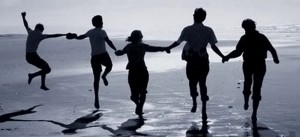Desiring Human Acceptance
 On a number of occasions I have written about the loneliness of disability. I suppose readers might be apt to think loneliness is not unique to people with severe disabilities, and they are right. Most lonely people are not disabled. You don’t even need to be alone to be lonely; a person can be lonely in a crowded room. The issue is interconnectedness with others.
On a number of occasions I have written about the loneliness of disability. I suppose readers might be apt to think loneliness is not unique to people with severe disabilities, and they are right. Most lonely people are not disabled. You don’t even need to be alone to be lonely; a person can be lonely in a crowded room. The issue is interconnectedness with others.
Humanity was created for relationships. We are hardwired for connections with others and for intimacy. I’m not referring to intimacy in a sexual context (although that is important in marriage). I am referring to a broader context of intimate human friendship and belonging.
Being cut-off from intimate human friendships and the accompanying sense of not belonging to a social group is a source of deep loneliness. In his brilliant and penetrating 1943 essay entitled The Inner Ring, C.S. Lewis wrote about the human desire to belong to certain social groups and the terror of being excluded from them. He described the rings of social groups in society like skins of an onion.
All people may, at any point, be included in or excluded from a desired social Ring, or try to pierce through to a Ring, or be in the process of being thrown from one. Lewis said, “I believe that in all men’s lives at certain periods, and in many men’s lives at all periods between infancy and extreme old age, one of the most dominant elements is the desire to be inside the local Ring and the terror of being left outside.”
The desire to be on the inside of a society of people may not necessarily be for the snobbery of high life. A person may desire to be part of a particular grungy artistic côterie or some intellectual or political clique. It is an aspect of life people may not speak about – particularly when they are trying to get into a new group ? when they are still one of “them” rather than one of “us”.
We see this desire to belong blatantly displayed with teenagers. The yearning to fit into a particular group will propel a young person to do odd or drastic things to gain acceptance. It can become all-consuming for them. Behavior, clothing, general appearance and morals will change to identify with, and be accepted by, a particular social group of teens ? often identified as the “in” group. In order for there to be “in” groups, there must also be “out” groups. An “in” group maintains its elitism by remaining small and making entrance difficult for some and impossible for others. They create terror for the excluded by cruel and humiliating reminders of their exclusion.
The excluded will try to find some point of affinity with another group to which they stand a chance of gaining acceptance. The drive to be accepted and enjoy intimate friendships is very strong. When it is denied the soul aches, the heart breaks. Being rejected by all social groups is too horrible to contemplate and creates unbearable dimensions of loneliness.
For many people with profound disabilities, they are often excluded from all social groups.
Before my own disability, gaining acceptance within certain desirable social groups was easy. Once inside the group, I built my status as relationships were established. (This was immensely useful to my career and raw ambition.) That all changed the day I was diagnosed with an incurable and degenerative disease. Doors to my social rings of people quietly closed and did not reopen. Intimate human relationships of friends grew cool and eventually went cold. It all happened with the greatest of politeness and aplomb but there was no mistaking it: I went from warmth of “us” to cold shock and dismay of being with “them”.
The unstated rejection was complete: Invitations to intimate discussions huddled with like-minded people ceased. The warm reassuring winks, nods and subtle smiles of acknowledgement about some esoteric point of understanding, agreement and approval disappeared and were replaced by blank stares or worse: expressions of pity! I cannot express in words the horrible shock of becoming an outsider.
It was only when I eventually discovered that it didn’t matter. I was accepted by the Holy One who died as an outsider, rejected by men. There is no need to strive to reach for an invisible ring of earthly acceptance or fear of losing it. My desire for intimacy is fulfilled in a relationship with Christ. I have unconditional acceptance by the creator of intimacy.

